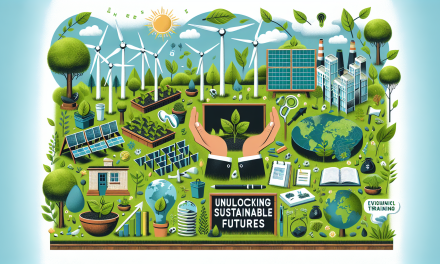Table of Contents
- Introduction
- The Importance of Water Treatment
- Key Skills and Knowledge in Water Treatment
- Hands-On Experience in Water Treatment
- Certification and Recognition
- Continuing Education in Water Treatment
- FAQs
- Conclusion
Introduction
Water plays a vital role in our lives, not just as a resource for drinking but also for sustaining various sectors, including agriculture, industries, and domestic use. Consequently, the need for effective water treatment methods has become increasingly critical. Due to this demand, individuals seeking to enhance their professional expertise and career prospects find value in specialized training focused on water treatment systems. In this article, we will explore what one gains through such training, understanding the necessary skills, and embracing hands-on experiences that mould professionals in this essential field.
The Importance of Water Treatment
Water treatment serves multiple purposes and is crucial for ensuring that water remains safe for both personal and industrial uses. Furthermore, the treatment process helps prevent waterborne diseases, protects aquatic ecosystems, and contributes to environmental conservation. Through advanced techniques and modern technologies, the water treatment industry strives to provide clean and safe water. Cognizant of its importance, professionals involved in this field actively seek to improve their competencies.
Environmental Impact and Sustainability
Furthermore, understanding the environmental impact of water usage and waste management is essential. By optimizing water treatment processes, professionals contribute significantly to sustainability efforts, such as minimizing energy consumption and reducing carbon footprints. Those interested in enhancing their understanding can explore opportunities like Mastering Energy, Carbon Management, and Environmental Practices for a Sustainable Future which tackle energy and environmental stewardship at large.
Key Skills and Knowledge in Water Treatment
Gaining expertise in water treatment entails acquiring a range of skills and knowledge. Understanding chemical processes, biological treatment methods, and mechanical systems forms the core foundation relevant to water treatment operations. Additionally, a solid grasp of regulatory frameworks and compliance laws aids professionals in operating within legal parameters.
Fundamentals of Chemistry in Water Treatment
Knowledge of chemistry proves indispensable when working with water treatment processes. Individuals involved in treatment must be able to interpret chemical reactions, anticipate the impacts of additives, and understand water quality parameters. By applying this knowledge, professionals can ensure water meets safety standards. Furthermore, learning about emerging technologies in water treatment can provide valuable insights into innovative solutions.
Understanding Biological Treatment Methods
Biological treatment methods, such as activated sludge processes and anaerobic digestion, present effective solutions for managing wastewater. Professionals can significantly contribute to environmental management through an in-depth understanding of these methods. For additional insights, refer to resources like Enhancing Environmental Stewardship through Effective Management Systems – A Comprehensive Guide.
Hands-On Experience in Water Treatment
Incorporating theoretical knowledge with hands-on experience greatly enhances the learning process. Engaging in practical applications empowers individuals to tackle real-life challenges that arise during water treatment processes. This experiential learning fosters confidence and innovation, allowing professionals to experiment with various techniques and protocols.
Importance of Training Facilities
Access to training facilities equipped with modern technologies enables participants to apply their knowledge effectively. Notably, those enrolled in training can access modules that simulate real-world situations, thereby enriching their understanding. To explore a comprehensive program, check out the Water Treatment Training Course for Engineers & Operators which offers practical knowledge and networking opportunities.
Certification and Recognition
Certification serves as a benchmark for validating one’s skills and knowledge in the water treatment sector. Many employers prioritize certifications as a means of assessing candidates’ understanding of water treatment protocols and industry standards. By earning recognized credentials, professionals enhance their employability and career prospects.
Types of Certifications
Various certifications exist within the water treatment field—each offering distinct focuses. From state certifications to specialized credentials, applicable learning pathways abound. Collaborating with professional organizations contributes to maintaining knowledge about certification requirements and examination processes.
Continuing Education in Water Treatment
The water treatment landscape constantly evolves. Continual education enables professionals to stay current and effective in their methods. By participating in workshops and attending industry conferences, individuals can tap into the latest innovations and best practices. Consider exploring programs focusing on relevant topics such as climate change adaptation through resources like Navigating the New Normal: Climate Change and its Impact on Trading Services.
Frequently Asked Questions
What kind of professionals benefit from water treatment training?
Water treatment training caters to various professionals, including engineers, operators, environmental scientists, and facility managers seeking to enhance their knowledge and skills in managing water resources effectively.
How long does water treatment training typically take?
Training duration varies based on the program and institution. Generally, courses can range from a few days to several weeks, offering different levels of engagement and knowledge acquisition.
Are there online resources available for water treatment education?
Yes, numerous online resources and courses are available for water treatment education. Engaging with online platforms provides flexibility and convenience for professionals aiming to expand their knowledge.
Is certification necessary for a career in water treatment?
While not always mandatory, certification is highly regarded in the industry and can significantly enhance job prospects and credibility within the field.
Conclusion
In summary, exploring the realm of water treatment reveals a wealth of knowledge and potential career advancements. By gaining essential skills, engaging in hands-on experiences, and pursuing certifications, professionals can significantly impact water quality management and environmental sustainability. For those aspiring to enter this vital industry, opportunities abound, and continuous learning remains integral. Ultimately, embracing education and innovation will foster a brighter, cleaner future for water treatment efforts globally.





